Strap in, folks. AllyOz has gone full blown nerd academic in this article on coaching in Australia. Fair warning: the article does take a bit of time and might need to be pondered on for a bit. I’ve whacked in some pictures for those of us who need them (Hoss) while the rest of us rugby tragics devour the sacred missal of the day. As usual, I’ve added in some extra news articles at the bottom though I won’t be disappointed if you don’t quite have the capacity to get there!
Happy reading, folks!
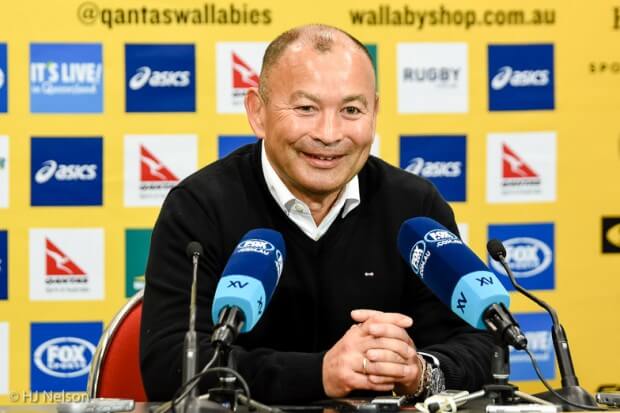
AUSTRALIAN COACHING IS THE PROBLEM, NOT AUSTRALIA’S COACH
In a recent interview on Virgin Media Sports, former Ireland international Rob Kearney was asked to comment on his time playing in Australia. His comments were enlightening. Kearney said, “the quality of coaching surprised me the most” and Kearney wasn’t positively surprised. The other guest, former Waratahs, Ireland A and Scotland coach, Matt Williams, was even more direct. “Australian rugby was renowned as the best thinkers from the 1990s up to the 2003 World Cup, at making creative players”. Williams commented, “Now we’re seeing Ireland with far more creative players than Australia. It’s all about coaching and coach education.”
NO ONE HOME Australia, the winner of two Rugby World Cups, used to export coaches to the world. Many may still ply their trade overseas but, recently, there’s been a growing reliance on overseas coaches to lead the countries Super Rugby teams, African born coaches like Jake White, Dave Wessels and Kevin Foote and New Zealanders like John Mitchell, Daryl Gibson and Rob Penney. Simon Cron and Brad Thorn, though spending time in our systems, also spent much of their careers in New Zealand.
At international level we’ve installed two New Zealand coaches as our national coach, Robbie Deans, and the incumbent, David Rennie. Under the right circumstances they may be the best choice. I was a fan of the initial choice of Robbie Deans, and probably remained a fan longer than most. When Dave Rennie was appointed I couldn’t really see a better alternative, and I probably still can’t. In addition to head coaches, we have also had several foreign-born specialist coaches for the Wallabies, particularly around scrummaging and forward play.
This isn’t an attack on foreign coaches but, for me, their presence raises some interesting questions. If the best candidate for the job is someone from outside our system, what’s gone wrong with our system? And, if we don’t have coaches good enough to compete for the best coaching jobs at club, Super Rugby, and national level, what does that mean for the development of skills of our players who are coming through our systems with coaches not good enough to reach higher? If our coaching training structures can’t produce world class coaches, should we be surprised players skill levels are dropping? If we are more and more reliant on foreigners to fill the gap can we ever re-discover the unique style of play that allowed us to become the world’s best rugby nation and that excited our domestic crowds.
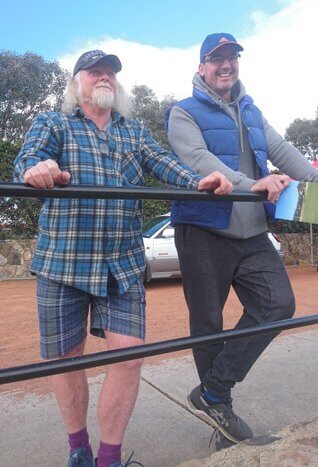
THE RISE AND FALL OF WALLABIES COACHING
A simple winning percentage may be a rather blunt way to measure coaching performance, but it paints an interesting and clear picture. In the late 1960s and early 70s Australian rugby was in a parlous state. The 1960-70s era saw five national coaches used: Bryan Palmer only coached 4 games, 2 in 1962 and 2 in 67, either side of Alan Roper; Bob Templeton, who had great success with Queensland, held the Australian coaching role on 3 separate occasions, 1971–73, 1976 and 1979–82. Des Connor and David Brockhoff were the other two.
In the 1980s Bob Dwyer had a relatively unsuccessful stint between 1982-83 before being replaced by Alan Jones in 1984. On his return to the job Dwyer had a better time winning the second RWC in 1991 and increasing his overall winning percentage to 63.01%.
Our winning percentage peaked under Rod Macqueen (79.07%), which included our second RWC win in 1999, a British & Irish Lions victory, and a couple of Tri-nations and Bledisloe Cup wins. It was clearly the golden era of Australian rugby. Eddie Jones took us to another RWC final in the second year of his stint, but his winning percentage at the time of his sacking had fallen below the 60% exceeded by his five predecessors. I was never a particular fan of the way John Connolly’s sides played but I also feel he was extremely hard done by as an Australian coach. There was a very strong argument that he should have been installed as coach following Macqueen, but when he eventually did get a go, he was given a team in decline. He then had a short run in to an RWC and was removed when they failed to perform. While I wasn’t a Queensland fan at the time, I think there was a fair bit of politics in the decision and his record compares well with those that followed him.
Since Connolly we have had 4 coaches, 2 New Zealanders and 2 Australians, and the winning percentage has declined across the last 15 years. Michael Cheika does have the benefit of coaching across two RWC cycles, so he gets a few more games against minnows in RWC group games; neither McKenzie nor Rennie benefitted from that.
The overall trend is certainly not our friend. We’ve clearly been in decline since the beginning of the century; identifying what underlies it is a lot more difficult. However, I think there were some key events that determined both the heights that Australia reached at the turn of the century and the fall we’ve experienced since and, while it’s very much related to coaching it isn’t solely the fault of the coaches who have led the Wallabies in our period of decline, not by a long shot.
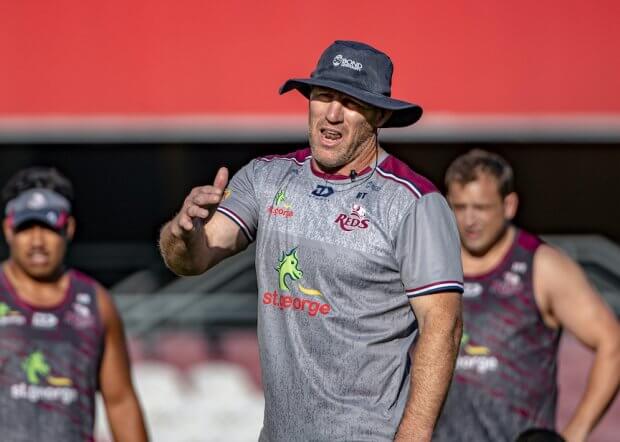
INTRODUCTION OF THE NATIONAL COACHING SCHEME
The poor results of the late 1960s and early 70s triggered a lot of soul searching at the ARU and their response to the challenge was the catalyst that took us to the pinnacle of world rugby on two occasions and saw us regularly beating the All Blacks. In 1974, the ARU appointed Dick Marks as the National Coaching Director and entered into an agreement with the Rothmans National Sports Foundation (the filthy death sticks manufacturer) to establish the National Coaching Scheme. Rothmans had already supported similar schemes in cricket and other sports; my dad was beneficiary of the cricket coaching scheme. Eventually, the controls imposed on tobacco sponsorship put paid to Rothmans’ involvement. Wales was one of the leading sides in the 1970s so Marks was sent there to observe, with Ray Williams, how Wales trained their coaches. Marks unapologetically copied large parts of that scheme and implemented it in Australia. There seems to’ve been, despite the historical divisions across the states, little opposition to the scheme, I assume largely because it developed as support to the state bodies and, with Rothmans paying the bills, no issue about who spent what money.
It was focussed heavily on developing coaches to teach basic skills across all levels, but it wasn’t a top-down approach. Marks canvassed many of the top coaches around Australian rugby at the time, working with them to develop the coaching manual and the workshops were a two-way process with many ideas developed in the sessions, making their way back into the manual. It was very much a hands-on process with the courses that were developed held over weekends at schools and other locations with coaches staying overnight. There were a lot of ideas exchanged during the social networking at the courses. Down the track the ARU took over funding, but the scheme was largely self-supporting with course fees and book sales covering most of the costs. There was also a stronger focus on strength and conditioning and scrummaging technique, two eras where the Wallabies were particularly lagging.
The role of the Coaching Director and the development of a National Coaching Panel expanded over time. It later began preparing analysis and material for national coaches and was involved with the selection of the national coaching with a sub-committee interviewing applicants for the role. The Coaching Director reported directly to the CEO, as did the coach but they were separate entities.
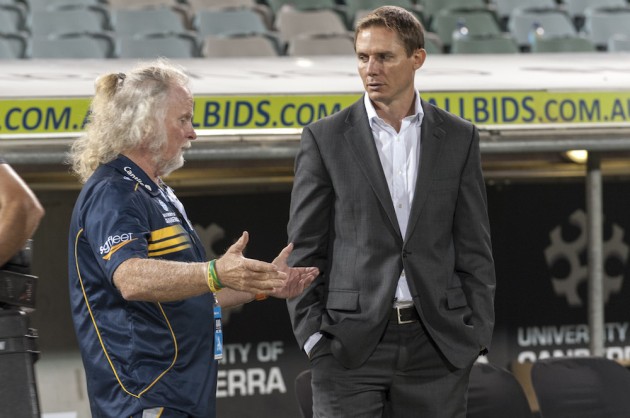
FOR EVERY ACTION….
If we look at the commencement of the scheme in 1974, and look at the improvement in the performance of the Wallabies over time, it’s hard to argue the scheme didn’t play a major part in that improvement. The scheme’s first graduate coaches would have been working with students from 1975 on. In 1977-78 Australia produced the all-conquering Australian Schoolboy team; by the early 1980s this team starts to feed into the Wallabies teams that win their first Grand Slam, start defeating the All Blacks and winning Bledisloe Cups. But it doesn’t stop with that first golden generation, it continues to feed in players through to the early and late 1990s that will win RWCs and British & Irish Lions tours and play an innovative, highly skilled, intelligent style of play unique to Australian rugby, based on the strengths of our game.
The scheme didn’t really outlive the introduction of professionalism. Marks sheds home the blame to John O’Neill, who removed the position of Coaching Director and put it under the responsibility of the national coach, if I understand it correctly. The National Coaching Panel was also dissolved, and the role of the national coach seems to have become all encompassing. Perhaps it was just too much. I personally undertook the Level 1 (1997) and Level 2 (1999) courses after the National Coaching Scheme was being wound down and the responsibility transferred from the National Coaching Director and the National Coaching Panel that he chaired to become another responsibility for the Wallabies Coach. I think, even then, while excellent, they had perhaps started to be impacted by the changes.
While the results didn’t fall away immediately by the end of the Eddie Jones era things seemed to be catching up with us. We didn’t seem to be producing the world standard players that we had previously. At the height of the Wallabies powers there would’ve been five or more players worthy of selection in a World XV. For much of the last 20 years we’ve maybe had 1 or 2, and now, I don’t think we have a player in that group.
In terms of particularly positions, I think you can make an argument that the dearth of 10s and 15s can be traced back to a fall in coaching standards. Players at 10 and 15 must have the highest standard and greatest range of rugby attacking skills of any player. If you don’t have all those skills then your game management also suffers. Is Quade Cooper a better decision maker than Bernard Foley, or Noah Lolesio, or is it easier for him to make the right decision because his skill level, across all the request skills is better? Foley can’t make the correct decision to kick 30 metres to a corner if he hasn’t got the capacity or skill level to do it, so he throws the pass instead, a second-rate decision brought on by his inability to perform a skill. Equally does he turn the ball back into the forward because he doesn’t have the pass to cut out the centre and go directly to the winger in the clear? I feel that the key decision-making positions of 10 & 15 are perhaps the most susceptible to declining skill levels.
I would argue that it wasn’t primarily that the National Coaching Scheme was giving us good coaches at the elite level, although that was a benefit. I contend that the National Coaching Scheme gave us better coaches across all levels, which improved the skills of our players from an earlier age and allow them to develop faster and further. I was never a great coach, but I was a better coach because of the scheme and my players better for that. When the 12 year old Tim Horan started playing at Downlands College he had basic passing and tackling skills embedded earlier; that means each step of the way he was a step ahead of where he would’ve been. The players around him, even those who aren’t as talented or athletically gifted, are also better skilled, so that means he must work that bit harder and better to compete too, and that makes him a better player overall; iron sharpens iron. Do we even see the brilliance of the Ella brothers, if they don’t have a qualified coach at Matraville High?
We talk a lot about competitions structures and cohesion, etc. here, but these concepts tend to assume that, if you have the right competition structure and pathway that a player will somehow organically develop the skills required to play at an elite level just by playing the game. Then we just skim off the cream, stick them in an academy, next stop the Wallabies. I think the drop off in focus on correct skills coaching plays a more significant role and without it, the benefits of cohesion are lessened.
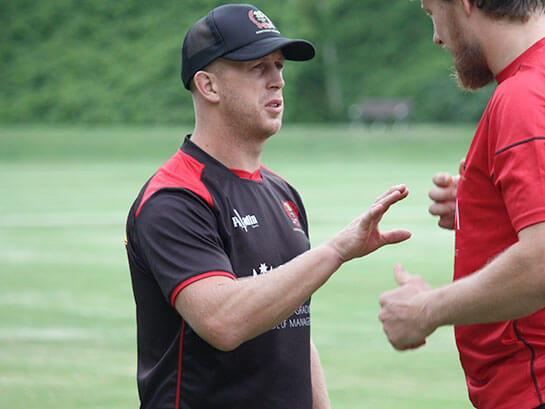
FINGERS DOWN A CHALKBOARD
While coaching courses continued to be offered by state bodies after the demise of the National Coaching Scheme, I’m not aware of any review carried out in the first decade and a half of this century on coaching training. Perhaps the sporadic wins along the way, like the RWC2015 final allowed us to ignore the developing trend, perhaps the focus on the elite level, the expansion (and later contraction) of Super Rugby and the regular crises that appeared to envelop the game here on an all too regular basis took the focus away from this critical element.
There did appear to be some positive moves in July 2017 when it was reported that Rod Kafer would take over as the ARU Coaching Development Officer. Kafer appeared to have some great ideas. Kafer, Fox’s halftime analyst with “Kafe’s Chalkboard”, had limited direct coaching experience. He coached English Premiership club, Saracens, for part of the 2003-04 after Wayne “Buck” Shelford had been sacked as coach. At the time of his appointment Kafer commented that Australian rugby doesn’t have an immediately identifiable game style and must determine what that should be. “When Australia was great, we recognised that there was a team who were innovative, they were thoughtful, they were prepared to bring something a little bit different. We need to establish in Australia, a concept of unity, of purpose. What are we about? What are things that when somebody looks at an Australian rugby team play, they can immediately identify?”
The National Coaching Advisory Panel was due to be operating by September 2017. Later in the process Kafer talked about developing the skills of a modern rugby players. Kafer’s intention was to identify a list of skills that every player, of every age, can learn to master.
In July 2018, Kafer held a summit of top-level coaches that included Bob Dwyer, John Connolly, Michael Cheika, Wallabies Skills Coach and current Drua head coach, Mick Byrne, and RA’s high performance boss Ben Whitaker. Alan Jones and Rod Macqueen were both invited but were unable to attend (Jones had been critical of Kafer’s appointment). Kafer commented that, “we’re talking about developing a group that will develop a national coaching strategy and enhance the core role that coaching plays in inspiring and developing all involved in the game”. That sounds a lot to me like the former National Coaching Scheme, although Dick Marks, in his excellent book The Descent of Australian Rugby, doesn’t appear to be a fan, accusing Kafer, Raelene Castle and Ben Whitaker of “incompetency” and “appalling manners”. There also appeared to be some uncertainty about the focus of the programme. While Kafer had talked about developing a national coaching strategy, which, to me implies develop at all levels of the game, he had mostly been working with the Super Rugby coaches. A decision was taken in mid-2018 to appoint a Chair for the National Coaching Advisory Panel but I can find no record of one being appointed.
After 18 months in the job, with seemingly nothing more achieved than a mission statement, a high-level coach’s summit and a promised but never delivered National Coaching Advisory Panel, Kafer left, apparently of his own accord, commenting that it had been “an interesting journey” with “ups and downs” and saying, “it’s a complex, complex system that does require change.” Scott Johnson had recently taken over as Director of Rugby and that seems to have spelled the end of Kafer’s role. In retrospect, the Director of Rugby role probably made Kafer’s role redundant, but Johnson’s role seemed almost exclusively focussed on the elite level, primarily concerned with first managing Cheika, and then replacing him. I was never certain if the role was necessary and how a Wallabies National Coach, a Manager of High Performance, an ARU Coaching Development Officer and a Director of Rugby all worked together and how they split roles. However, I had hoped that, with Dave Rennie in place, that Johnson might focus on a National Coaching Strategy. He too was gone within 12 months of Rennie’s appointment.
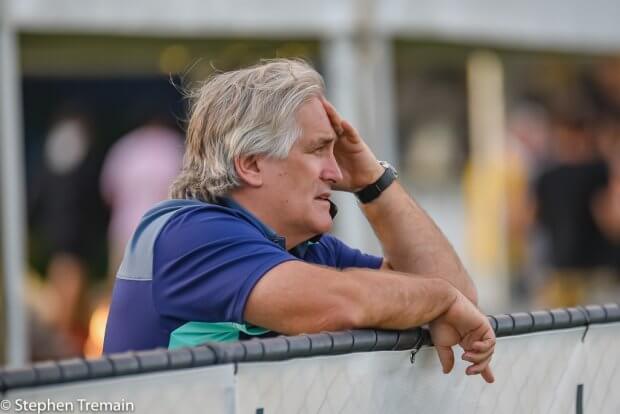
BACK TO THE FUTURE?
It is common, at a certain age (one I have undoubtedly reached) to view the past with rose coloured glasses. However, it’s hard to look at the Wallabies more recent performances, compare them to those from two decades ago, and not recognise that we’ve slipped. It’s also rare that one area alone can explain why a particular phenomenon has occurred. I believe though that the best explanation for Australia’s declining performance has been the deterioration in the quality of coaching, not just at the elite level, but throughout the system. It isn’t surprising that we look to foreign coaches when our own homegrown coaches don’t appear to be of the standard required but the fact that they aren’t also means that our player quality is declining too.
So how do we fix it? In a way I’m reluctant to write this as I know, as a low-level coach with only a basic understanding of the parts of the rugby community that have been involved in, there’s a great deal I don’t know. But I still want to have a go at it. I don’t want this to be seen as a criticism of existing coaches, they’re doing the best they can. It’s a tough job, you get little thanks, and you give up a lot. I was a coach of limited ability, but my ability was enhanced by the structure that was in place and the strong emphasis on skills coaching that was a key part of it.
Firstly, I think Kafer had some good ideas. Before further intellectual property is lost, and while the coaches of the golden generation are still around, I’d like RA to reappoint a National Coaching Director; for their first task, the director could call a summit of past high-level coaches and key administrators. Those that understand how the successful scheme of the past was run like Dick Marks and others that time. High level coaches like Dwyer, Jones (A & E), Macqueen, Connolly, Johnson and the current coach, Dave Rennie, could also be involved to thrash out a National Coaching Strategy. Ideally, the initial focus on this would be on the grassroots level, concerned with reinstituting or reinvigorating a National Coaching Programme, identifying the skills of Kafer’s future rugby player and developing resources and training all coaches on how to perform them.
To ensure it gains acceptance across the board a future scheme should be rolled out, as the initial scheme was, with a theme of supporting and assisting existing structures like state bodies and clubs: provide resources to them to help them develop their existing coaches and find and train new ones. If resources are limited that might require some pilot schemes in the initial stages. Target an area where there’s potential, and where there are some existing club structures, but they are struggling and work with them. Areas like Penrith or Parramatta where, with some initial focus of resources, we might be able to have a relatively quick win that can gather further momentum.
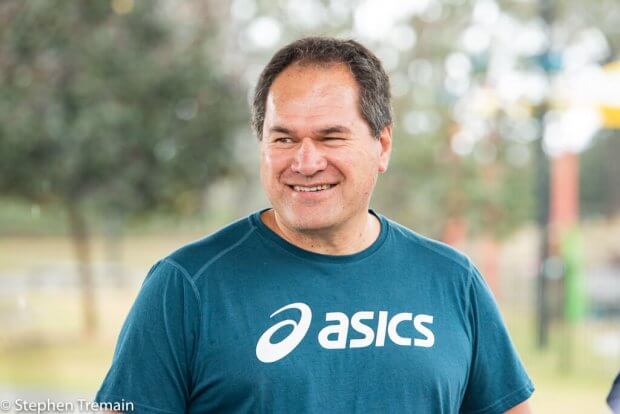
If additional funding is required I believe that a National Coaching Scheme, should be a priority for some spending of any PE investment. If the PE investor hopes to reap a financial windfall down the track one of the best ways to guarantee that is to get the Wallabies winning again and that can only come if we have better coaches and, as a result, more skilled players. If the PE is spent elsewhere then let’s look for a specific sponsor to back the scheme. Rothmans involvement in the first scheme was an early example of sportswashing and maybe there are some sources of sponsorship that aren’t so palatable, but if we can land a coal miner or a gas producer looking to contribute let’s not be too fussy.
I’d also prefer a physical, face-to-face approach. I understand that there’s currently a big push to increase “digital resources”, largely because they’re relatively cost effective and easily accessible and easy to transfer to a wide audience for the supplier. The trouble is that I don’t think they are particularly effective for the end user because they allow limited interaction or feedback. There’s no way to gauge if a coach is using them or if they are correctly applying the techniques that are taught.
Face to face teaching allows for immediate correction, feedback and information exchange. It might be more costly, but it’s much more effective. Don’t worry about starting small. There’s a quote (perhaps falsely) attributed to anthropologist Margaret Mead “Never doubt that a small group of thoughtful, committed citizens can change the world; indeed, it’s the only thing that ever has.” It might not always be true but a lot of world changing religious and cultural movements have started with one person who developed a small group of determined followers. Just look at the impact of Geoff Mould at Matraville High, whose coaching gave us the Ellas, Lloyd Walker and Eddie Jones.
Let’s not get sucked into xenophilia. Yowie’ll have a field day with that one, but it simply means love of what’s outside, as opposed to xenophobia, or fear of outside. We seem to have developed a fascination with the game as it’s played in other parts of the world. But when the Wallabies were winning they were playing their own brand of rugby, uniquely developed to suit our strengths, our skills and our culture and natural environment. That isn’t to suggest that we exclude influences from outside. The first National Coaching Scheme was based on one that had been operating in Wales, but we didn’t seek to take Welsh coaches, we sent our own coaches over there to observe their systems and then bring back the lessons and adapt them to our unique circumstances. We seek to copy New Zealand because of their success, but New Zealand didn’t succeed because they copied from others, they developed, adapted and innovated based on their strengths and skills and natural attributes.
We seem to require now, as a standard, success at “international” level for our Wallabies. That delivered us our last two coaches, Michael Cheika and Dave Rennie. Cheika is the first coach to ever coach a side to victory in the premier northern and southern hemisphere competitions. Rennie won two Super Rugby titles and his Glasgow Warriors side made two consecutive Pro 14 finals and a quarter final appearance in the European Championships. How has that panned out? Both struggled to keep the Wallabies above a 50%-win rate. Our most successful coaches were Dwyer, Alan Jones, Macqueen and Connolly. One came straight from club coaching, others coached state sides or Super Rugby franchises, but none coached outside Australia before they took on the Wallabies job. We’re starting to see a good group of locally developed coaches emerge now and, hopefully, one or more of them can develop to a level to take on the Wallabies. I’ve nothing against foreign coaches, but while our domestic coaches aren’t good enough to compete for the top job, we won’t be developing good enough players to allow them to win. Australian coaching is the problem, not Australia’s coaches.
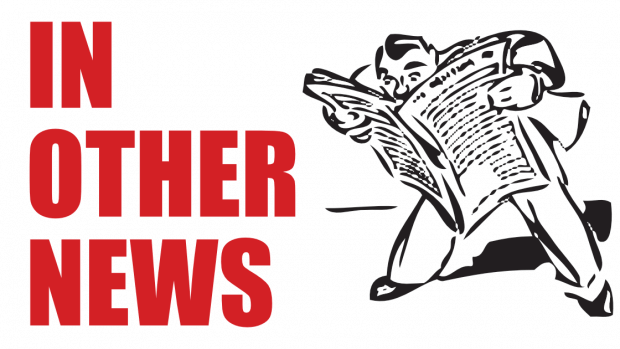
Bernard Laporte, among others, found guilty in a corruption scandal in Frogland. See article here from the Guardian and here for GR’s article in the Shake My Head News.
Eddie Jones to coach the BaaBaas in May. Article here
Pau coach, Sébastien Piqueronies, is in deep shite after physically attacking Scottish referee, Sam Grove-White, after Pau’s late loss to the Cheetahs. Personally, this is yet another symptom of post-Rassiegate where World Rugby have made a rod for their own backs by not adequately dealing with referee abuse. I expect that either the proverbial book will be thrown at Piqueronies, or (as the cynic in me thinks) the chocolate wheel of justice will spin to yet another mitigated sentence (coz he’s French). No Laporte to save him now though!
Happy reading, folks!
CM


